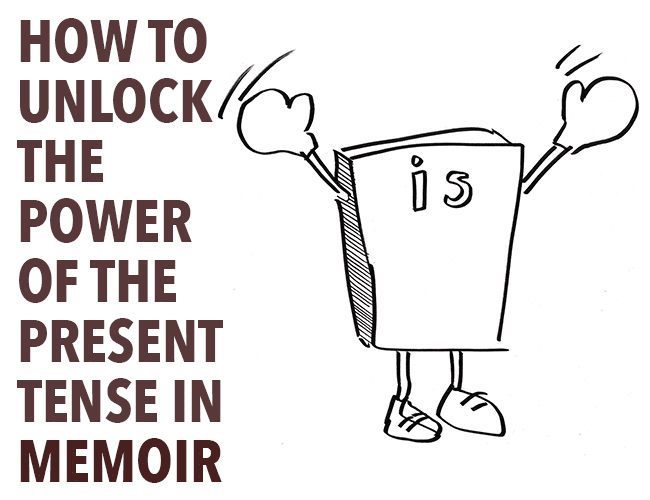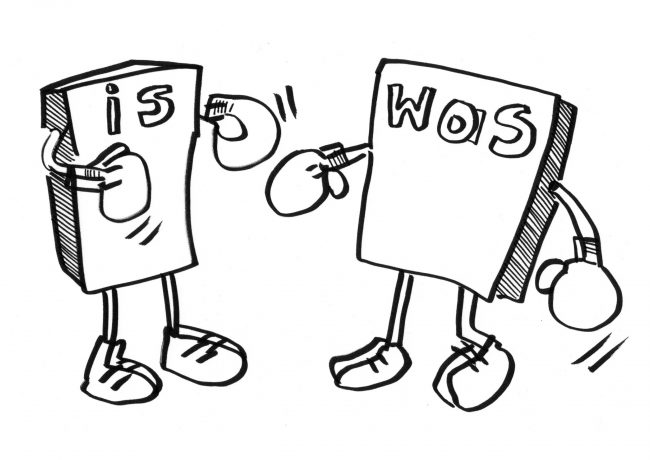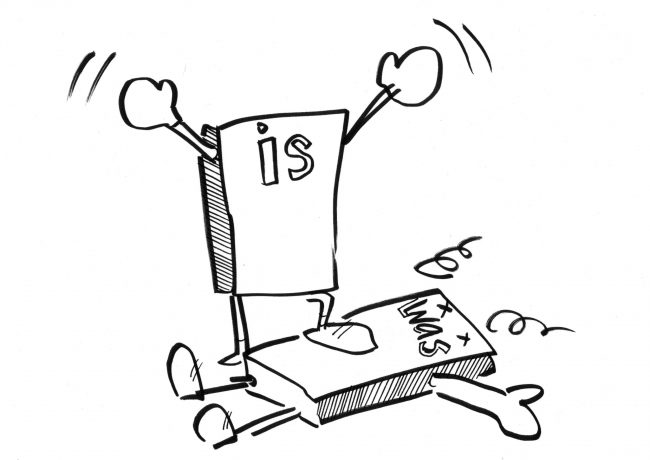Memoir is about something that happened in the past. You can write the story in the past tense. Or you can write the story in the present tense, as though it is happening now.

There is power in the present tense.
Past Versus Present Tense
Each year, a storytelling event called Brava! is held in Troy, New York. The event raises funds to provide bras for women living at the YWCA of The Greater Capital Region in New York State. A few years ago, stories about the role of bras in our lives were solicited.
The story I wrote, “I Am Not Wearing a Bra,” is about an incident I experienced in middle school.
When I first wrote the story, I wrote it in the past tense; it was something that had happened to me. Writing was instead of is made the story feel removed. It was a story about remembering.
There was only one girl in my class who wore a bra. Her name was Joanne. She had a real bra, with padded cups, thin straps and a hook in the back.
Changing the tense of the story to the present tense gave the story drama and a sense of immediacy.
There is only one girl in my class who wears a bra. Her name is Joanne. She has a real bra, with padded cups, thin straps and a hook in the back.

The Power of the Present Tense
Several stories were selected by a jury to be read at the event, including mine.
Five people read ahead of me. I had planned to read the story smiling and enunciating clearly. I thought I might get a few tears at the end of the story.
Not being able to speak at all when I stopped at the front of the room was not part of the plan. My eyes and my throat were full of tears.
As Marion Roach Smith, author of The Memoir Project, says,
Writing memoir in the present tense suits grief in ways that the past tense simply cannot provide.
Writing the story in the present tense brought back the feelings I felt in middle school when I was twelve, feeling ashamed, vulnerable, and rejected. Maybe I wouldn't have cried if I had written the story in the past tense, writing was instead of is.
But feeling is not a bad thing.
They will feel like they are with you in the story, living the moment and the memory as though it is just happening.

A Tense Choice
Choosing which tense you'll use is a difficult but necessary part of the writing process. If you haven't tried writing in the present tense, I encourage you to give it a try and see if it makes your memoir or creative nonfiction feel more alive. You might be surprised (among other emotions!).
Have you written in the present tense before? Let me know in the comments.
PRACTICE
Write for fifteen minutes in the present tense about something that happened to you in the past.
Please share your story in the Pro Practice Community and comment on a few other writers' practices.
Not a member yet? Join us here.
xo
Pamela
Pamela writes stories about art and creativity to help you become the artist you were meant to be. She would love to meet you at www.ipaintiwrite.com.




All my books are present tense. The immediacy fuels the action. Also, first person; because, for me as a reader, being inside someone’s head fuels the emotions.
Hi Barbara,
I looked on Amazon, are you Barbara Neville? Please post a paragraph from one of your books to share something you have written. I am loving the present tense. Totally changed the tone of my writing.
Hugs to you.
xo
Pamela
Yes. I am Barbara Neville. Here is a sample from my latest novel, “Tomahawk Trail”:
“I’m afoot and trussed up. I’ve seen no sign of Güero. I’m royally pissed. My wrists are tied together by a rope. The other end of the long rawhide lasso is tied to a saddlehorn. They’re leading me into camp now.
I’ve already been pulled, prodded, dragged and pushed at least ten miles. My horse is behind me, carrying one of the soldiers who escaped from us at Dynamite Canyon. He’s injured, half out of his head. Mumbling, under his breath, speaking in tongues or some such. Unintelligible.”
Because I employ a fair amount of action n my novels, I love present tense. I’m also a big fan of the Write Practice. I really appreciate all the advice. Cheers, Barb
Hi Barb,
Oh, thank you for sharing part of your novel. Just that little paragraph and I want to know more. I know what I have to buy now. 🙂
I hope you have a wonderful day.
xo
Pamela
Thanks Pam. I love you memoir talk. Keep up the good work.
Pam, I love the simplicity of what you say in your article. By just changing ‘was’ to ‘is’ really shifts the emotion in the writing. I began a reflective piece recently about a sad event in my past
which I started writing in the past tense, but then I shifted and started writing as if the event was happening now. Doing that helped me get caught up in the story to the point I felt my heart rate change and I had tears welling up in my eyes. It was very powerful.
Hello Deborah,
Thank you for sharing how changing tenses affected you. I am amazed at how much more feeling there is in the present tense. If you would like to share some of your story, I would love to read it.
xo
Pamela
Hello Pam, Here is the first paragraph of the piece I mentioned earlier.
Saving Patrick
You’re ready, arriving by C-section. But yours isn’t the typical delivery.
Monitors hum and click in the delivery room. A group of 4 doctors, experts in their field of neonatology are scattered around the room. They’ve been assembled to save you.
Two nurses ready the bassinet for your first bath, and the priest stands close, ready to baptize you when you arrive.
I liked this and feel as if I was there in the delivery room wondering what the baby’s condition is and why a priest is present.
Thank you Sharon I appreciate your feedback.
“But yours isn’t the typical delivery…They’ve been assembled to save you…, and the priest stands close” …. thankful to read the rest of that last sentence.
A powerful, intensely personal experience shared. One of those life experiences that somehow sets you apart as having what should have been a “shared experience”, but that was somehow different and unique. And that usually ends up being okay because it informs you in a way that shapes your perspective in a valuable manner. [ugghhh . re-read that comment and it’s a bit jumbled, but I hope the intent comes through. No time to edit.] : )
Thanks for sharing.
Thank you Susan. I appreciate your comments.
I have been playing for more than a decade with a story describing 20 years of my life slowly losing my wife to a terminal illness. Past tense seems to always leave the story needing something whereas present tense has brought it alive..,
Thanks for this fabulous article, Pam. I enjoy reading novels, stories, fiction in the present tense. The simple ‘was’ to ‘is’ makes a huge difference in ‘feeling’ the story, literally getting under the character’s skins… living their experiences, so to say.
At the moment i don’t have time to write my fifteen-minutes’ practice, but I want to try writing in the present tense, maybe in longhand when I can’t be at my desktop.
Hugs to you and all the kitty gang,
Lilian
Hello Lilian,
Thank you for stopping by even if you don’t have time to practice today. Hugs to you and your animal family too.
xo
Pamela
Simple yet sophisticated article. I’m an inspiring writer (and a spoken word poet) and I’m really interested with this paradigm-changing topic. I was taught in school that if writing some memoir for the event that has had happened in the past, then use past tense. Now, it is proven that is not really necessary except when it is. Even though it is surely interesting to read a historical textbook in present tense, but sometimes, using present tense in writing does have limits somewhere when writing legal things especially. Well, I’m not against you or what here, just sharing a thought.
And I find an interesting connection in my native language (Malay), there isn’t really past tense in our writings except for the indicator that indicates the memoir taken place in the past like Yesterday or Last night. So when I first learned English language, this past tense and present tense is really a (hard) new thing to learn.
Again, thanks for the beautiful article,
Naim.
Would love to see an example of your writing!
Apa khabar? I grew up in Singapore (I’m from the US), and even though I studied Mandarin in school, I love the Malay language and just learned a bit on my own. I also teach ESL writing, but have never had a Malay student, so I was interested to hear your experience.
Selamat jalan!
Great article, Pam! Here’s my contribution for today:
The pain wakes me from a sound sleep. My eyes open to a room I don’t recognize at first. From a slightly opened door, light seeps in from a hallway giving the room a semi-lit appearance. I hear muffled sounds and voices emanating from that hallway.
I look out the window seeing only darkness. The big clock on the wall opposite my bed reads 3:15. My calf muscle becomes spastic again. The shooting pain catapults me to reality.
I remember I’m in the hospital after having surgery for a complicated fracture of the tibia, the inner and larger bone of the leg that’s connected to the ankle and knee. My immediate reaction is to press the call button for the nurse. She appears in record time…
Wow… when I read “The shooting pain catapults me to reality,” I felt a jolt go through my spine. Thank goodness the nurse appears in record time! : )
You did a great job of expressing that disorientation of waking up and having no idea where you are or what’s going on.
Thanks for sharing.
Thanks for your comment, Susan. I still have to finish that piece. I appreciate your input.
After reading your article, Pamela, I was curious to see how I wrote a particular piece … sure enough – present tense! Right now I have to grade papers and help my son with homework, so I’m going to post that piece … again. I wrote it in response to a TWP post nearly two years ago. It was a time of a lot of reflective writing for me. [I recall your kind and gracious support at the time, Pamela … as always.]
Perfect Imperfection
“Yay! I remembered how to cast on! Aren’t you proud of me?” .tk … swsh …………..tk … swsh “Not like you, huh, Mom? You’d be…” tk.swsh.tk.swsh.tk.swsh. Cool, long, thin cylinders of metal peek from the warm, purple wool, the blue tapered tips worn silver from use. .tk … swsh ………….tk … swsh. Eighty-two fuzzy purple circles wrapped around the knitting needles to honor a lifetime. Now we have nothing but time to share.
“Oh, darn, I messed up. Gee, I guess I can’t ask you how to fix it. Hee hee.” Conversation is relaxed … except her mouth is stretched open, not to utter a response, but to release the rasping air which cannot hold in the uneven gentle heaves of her chest; motionless silence, as with anticipation, interspersed with single staccato moves.
Soft yarn taut against the inside tip of my index finger. “I still can’t do it like you;” the thumb moves into place to help carry the yarn over and around. tk … swsh over and around… tk … swsh …over and around.
My fingertips run the width of my creation, stopping to celebrate the staggered gaps; not part of the design, but part of the design of life. A sacred textile with perfect imperfections.
Susan, I felt like I was knitting with you. It brought back memories of my mom teaching me to cast on. I was always so clumsy. She always did it so loose and perfect. Mine always tight and tense like I was choking the yarn! She’d tell me, “relax Deb, your gonna stretch the yarn.” I usually ended up pulling it out and would ask her to cast on for me. Of course she would smile and do it for me in lightening speed. It’s nice to have those memories of simple times with our mom’s. Thanks for sharing yours.
Oh … That is terrific, Deborah. Thanks for your story in response to mine! Yes, special memories of “simple times”, mother handing down to daughter.
LOVE the illustrations, Pamela!
Thanks, too, for sharing the story about such a powerful impact the language shift had on you… really interesting. I could feel that emotion welling in my chest.
I’m writing a memoir about navigating life with a Coast Guard search and rescue pilot. I just recently changed chapters into present tense and the clarity and emotion surged forth and drew me in, much deeper than past tense. Yet I wasn’t sure if it was OK, so that’s how I found you.
“The best part of family life is spending a couple weeks in the summer at Wildwood beaches on the Jersey shore. It’s there that Larry becomes enamored with the vast view of the ocean, the smell and taste of salty air, the colorful rays of sunshine as they illuminate and fade at the horizon’s edge, and the Seagulls playfully weaving and soaring in flight. He digs in the sand, runs on the beaches, and chases and swims in ocean waves. Gazing at the ocean he absorbs the energy created by each wave as it rolls in, generating its roar and gathering its force, only to relax and release in a soothing, rushing hiss as it collapses onto the shore . . . leaving behind a momentary display of delicate fizz, bubbles, and foam. He strolls along the boardwalk, people watching. Meanwhile the amusement park rides keep his head spinning and his adrenaline pumping.
I love the idea of writing part of my memoir in the present tense. Early on I’ve introduced two key time periods in the present tense which have a significant bearing on the rest of my memoir. My memoir ends with present day so that is also present tense. The rest is past tense. I’m still not totally convinced about my use of tenses!